
Therapy for clenching your jaw in Calgary
The exact cause of bruxism is unknown, but several factors are thought to play a role, including stress and anxiety, misaligned teeth, sleep disorders, alcohol and caffeine consumption, certain medications, and genetics.
Bruxism is considered important because it can lead to a number of oral health problems. Prolonged and frequent teeth grinding can cause significant damage to the teeth, including worn or chipped enamel, gum recession, and tooth sensitivity. It can also lead to jaw pain, headaches, and facial muscle pain. If left untreated, bruxism can contribute to more serious long-term oral health problems, such as temporomandibular joint (TMJ) disorder and facial pain. For these reasons, it is important to address and manage bruxism to maintain good oral health and prevent further complications.
How do you treat Bruxism?
Bruxism is typically treated with a combination of lifestyle changes and medical or dental interventions. It is important to work closely with a dentist or doctor to develop a personalized treatment plan that addresses the specific cause of your bruxism.
Some common treatments include:
Wearing a mouth guard
Custom-fitted mouth guards can help protect teeth from damage caused by grinding and clenching.
Stress management
Identifying and managing stressors can help reduce the frequency and intensity of bruxism episodes.
Muscle relaxants
Muscle relaxants can be used to temporarily paralyze the jaw muscles and reduce grinding and clenching.
Dental appliances
A dentist may recommend an orthodontic appliance, such as a splint or bite plate, to realign the jaw and reduce grinding and clenching.
Medications
In some cases, a doctor may prescribe medication, such as anti-anxiety drugs or muscle relaxants, to treat bruxism.
What is the cost of treating Bruxism In Calgary?
On average, the cost can range from $300 to $800 per treatment, and multiple treatments may be required for optimal results. Some insurance plans may cover the cost of Botox for bruxism if it is considered medically necessary, but many do not. It is best to check with your insurance provider to determine your specific coverage. Additionally, many dental and medical practices offer financing options to help make the cost of treatment more manageable.
Contact us today
to schedule an initial consultation & exam.
Your consultation will include an examination of everything from your teeth, gums and soft tissues to the shape and condition of your bite. Generally, we want to see how your whole mouth looks and functions. Before we plan your treatment we want to know everything about the health and aesthetic of your smile, and, most importantly, what you want to achieve so we can help you get there.
Frequently Asked Questions
The exact cause of bruxism is unknown, but it is believed to be related to stress, anxiety, sleep disorders, alcohol and caffeine consumption, certain medications, and genetics.
There is no cure for bruxism, but its symptoms can be managed with a combination of treatments, including stress management, a mouth guard, muscle relaxants, and therapy.
Treatments for bruxism include wearing a mouthguard, stress management, muscle relaxants, dental appliances, cognitive behavioral therapy, and medication.
While bruxism itself cannot be prevented, managing stress and avoiding triggers such as alcohol and caffeine can help reduce the frequency and intensity of bruxism episodes.
Prolonged and frequent bruxism can lead to oral health problems, such as jaw pain, headaches, tooth sensitivity, and damaged teeth. If left untreated, it can also contribute to more serious long-term oral health problems.
Bruxism can lead to worn or chipped teeth, gum recession, and tooth sensitivity. It can also cause damage to the jaw joint and surrounding muscles.
Common symptoms of bruxism include jaw pain, headaches, tooth sensitivity, and facial muscle pain. A dentist can diagnose bruxism through a physical examination and evaluation of symptoms.
While there is no cure for bruxism, managing stress and avoiding triggers such as alcohol and caffeine can help reduce its frequency and intensity. Wearing a mouth guard at night and practicing relaxation techniques can also be beneficial. Consult with a dentist for the best course of treatment for your specific situation.

